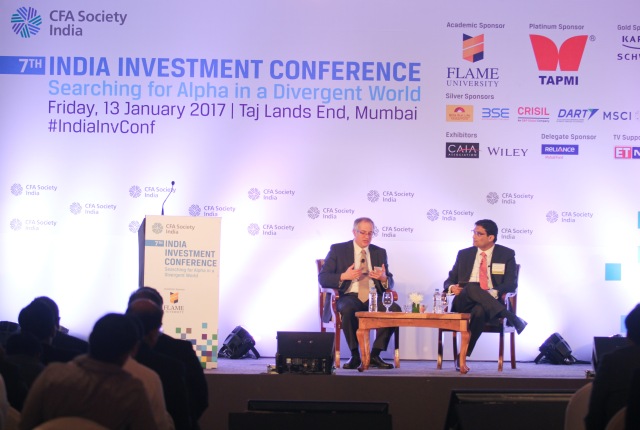- January 20, 2017
- Posted by:
- Category:BLOG, India Investment Conference, Mumbai
 Speaker: Peter Berezin, Senior VP, Global Investment Strategy
Speaker: Peter Berezin, Senior VP, Global Investment Strategy
Moderated by: Navneet Munot, CFA, Director, IAIP and CIO, SBIMF
Contributed by: Ishwar Chidambaram, CFA, Member, IAIP
According to Dr. Peter Berezin, the global economy is presently in a sweet spot- sitting pretty between Deflation and High Inflation. He termed this phase as Reflation, and said that the global economy will witness reflation phenomenon for the next few years. Investors must buckle up their seat belts for the transition. At present, global growth is accelerating and recent economic data have surprised on the upside. Consequently, inflation expectations have risen across major economies worldwide. This period has seen the end of fiscal austerity across advanced economies, including Europe.
Declining productivity growth is a structural problem in major economies, which has reduced supply and narrowed the output gaps. In fact, slow productivity growth is a global problem, although India is much better off. Although this is deflationary in the beginning (as Aggregate Demand is initially depressed), it transforms into an inflationary phenomenon, as supply eventually catches up to demand, causing the economy to overheat. The diminishing output gap will probably empower Central Banks in OECD countries in their quest for tightening monetary policy. Moreover, workforce growth is slowing across the major economies, resulting in a scarcity of new workers. An ageing population eventually pushes up interest rates, as the older population uses up its retirement savings.
Giving the example of Japan, Peter added that they are pricing in 0.5% inflation for the next 20 years based on swaps; however, the Japanese economy is beset with plummeting levels of savings and a tightening job market. Still, the BOJ is not expected to react, leading to declining yen and faster expansion/overheat in the Japanese economy. Surprisingly, in fact, Japan now enjoys higher female labor force participation as well as a wealthier middle class than the US does. He reflected that China appears to be following in Japan’s footsteps. Chinese workforce population will probably decline below that of Nigeria by the turn of this century. China’s problem is that of excessive savings, leading to a savings glut.
Addressing the nature of debt, it has dual characteristics of being both deflationary at the outset, and inflationary later. The easiest way to reduce debt is via inflation. This approach -of inflating your way out of debt- is used by several economies as a long-term solution for their debt problem. This can have unintended consequences, however, such as hyper-inflation (runaway inflation) or possibly even stagflation. One possible reason for the reappearance of inflation could be the decline of Globalization, as the latter tends to be inherently a strong deflationary (albeit reversible) force. He pointed out that the anti-globalization backlash in US is less about Donald Trump, and more a blue-collar rejection of Free Trade by Republican voters. He anticipates the US Federal Reserve to hike rates 3 times this year, which is higher than the market consensus. He also pronounced the demise of the 35-year Bond Bull market in the US.
Regarding trade wars, he believes that such a situation could arise, especially between US and China, and it would be bad news for emerging markets in general. He said that monetary divergences have driven up the US dollar index (DXY) to its present all-time highs. He is tactically bearish on global equities, given that NYSE stocks are trading at record high PE ratios, which could signal a potential bubble.
Comparing India with other emerging markets, India’s relatively poor human capital development in general, and lack of numeric skills compared to China would be a serious hurdle in replicating the latter’s growth trajectory. Education in India needs a huge impetus, for global competitiveness. Despite this, India leads the pack in terms of labor productivity, dethroning China.
Dr. Berezin is bearish on oil as he anticipates low demand and lower production costs. He is equally bearish on commodities in general, as they are structurally weak. He expects Brexit not to materialize, as Brussels will probably adopt a hard-line in negotiations to discourage other nations from following the UK. He is bullish on developed markets (versus EMs) and would overweight the former. Specifically, he would invest in Europe, Japan and Gold. He is bullish on Gold as a hedge against inflation. During reflation, he is optimistic about risk assets. He sees US small caps outperforming versus large caps, as large caps could be hit harder by the dollar rally.
- IC
























